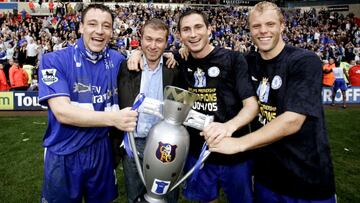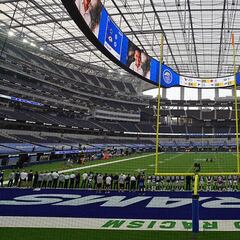John Terry, soccer and the future of NFTs in sport
More and more sports stars have been getting involved in the world of Non-fungible tokens, and this can give rise to a number of questions from trusting fans.

With so much time on their hands, it appears that soccer stars have a new play thing in the world of tech and investment. There's Paris Saint-Germain's Brazilian star Neymar, Liverpool's flying Scot, Andrew Robertson, and even former Chelsea and England defender John Terry. Getting involved in NFTs (non-fungible tokens) is all the rage and with these crypto assets it may be giving us a glimpse into the sport's ever-changing future.
Soccer and NFTs collide
You may have noticed Neymar or England defender Reece James change their social media profile picture recently to what appears to be a funky digital artwork of a monkey - part of the Bored Ape Yacht Club collection of NFTs.
Shorthand for "non-fungible tokens", NFTs are digital assets, possibly linked to an image, video or sound clip. While ownership of the originals is insured on a blockchain - the technology behind NFTs - many people are baffled why so much is spent on items which do not physically exist and are free to view online.
"Footballers are prime targets for these things," one agent who works with English Premier League players told Reuters.
You may also enjoy:
- Neymar's million-dollar NFT investment
- Which NFL players have stated that they invest in NFTs?
- How do NFTs hurt the environment?
- How can you make NFT digital art and collections?
- Gerard Piqué reveals the reason behind his selfie binge
"It is a status thing - going into training to say they own something. Like a watch that sits on the side they never wear."
Some owners of NFTs also hope to benefit from rising prices, giving them an incentive to promote their assets.
"These apes were selling for 180 dollars last year," Tim Mangnall, CEO of UK-based Capital Block, an NFT agency focused on soccer, told Reuters. "Now most sell for between $750,000 and $2 million. It's a very exclusive club.
"I'm a Bored Ape Yacht Club fan, but I think we are definitely in a bubble around NFTs and art."
The reaction has been mixed to say the least, with Robertson and fellow Liverpool defender Trent Alexander-Arnold forced to turn off their Twitter replies to their "collection" launch such was the volume of angry responses.
NFTs' links to cryptocurrency and the mystery around the new craze were the main areas of concern.
"There are plenty of fan engagement models around without getting involved in NFTs," Malcolm Clarke, chairman of the Football Supporters' Association told Reuters.
Giving away more free #NFTs 🎉
— Bored Ape Football Club Official (BAFCO) (@BAFCO_NFT) March 2, 2022
Like, Follow & RT 🏟
Drop your $ETH address 🏆
Tag a football fan ⚽️
OpenSea: https://t.co/zEuUrEpfDF pic.twitter.com/1XK1wWMzdD
This isn't the first occasion people in football have dabbled in speculative investment schemes, but this time the clubs want to cash in too.
Germany's Bundesliga has a NFT partnership with digital company Sorare, while U.S. National Basketball Association Top Shot platform proved so popular that the crypto company behind it, Dapper Labs, made a deal with Spain's LaLiga division. Sorare's status is being investigated by the UK Gambling Commission.
So just like basketball fans paid more than $200,000 for an NFT of a video of a LeBron James slam dunk, a rare digital trading card of Borussia Dortmund striker Erling Haaland sold for almost $700,000 in January.
The Premier League wants a slice of the pie.
"I know every single Premier League club has had conversations about NFTs," Mangnall added. "Fan engagement is the big draw. We haven't even scratched the surface on what clubs can do."
Exclusive: John Terry's Ape Kids NFT project has plunged 90% in recent weeks, with top players Ashley Cole and Tammy Abraham quietly deleting their endorsements as prices have crashed.
— Joey D'Urso (@josephmdurso) March 9, 2022
Meanwhile the Premier League is in talks over a huge official NFT dealhttps://t.co/9L7eIU1paa
The Premier League declined to comment when approached, but a source close to the dealings told Reuters the body is working through its options. British media reported any deal could be worth 400 million pounds to clubs.
Last month, former Chelsea captain John Terry removed the Premier League trophy from his "Bored Apes" after a legal intervention by the league related to its trademark rights.
Many top teams around the world have launched their own fan tokens, where supporters can pay for a say in minor things, like a pre-match song. Something again not universally well received.
Abramovich being sanctioned & John Terry's NFT scheme turning out to be ropey as all balls - really going to harm Chelsea's image as the cuddly, likeable neutrals' choice.
— Nick Miller (@NickMiller79) March 10, 2022
But with the money at stake, more of these kind of things seem inevitable, with the technology already in place for a new virtual world to open to the masses.
"I'm an Arsenal fan," Mangnall added. "I'll watch Arsenal play and then (coach) Mikel Arteta's interview. Then I'll watch shows with other people talking about it.
"Imagine if you could create an NFT that gets me in an exclusive club where I could get personal insight from Arteta that's only available to a select group of 1000 who own that NFT?
"The possibilities are endless."
Wanting to get into NFTs? Read on...
Non-fungible tokens, or NFTs are the latest trend in the cryptocurrency or digital assets sphere. Many believe that it is the latest trend that could help them increase their wealth.
However, while the idea may be attractive to young people, experts warn that buying an NFT may be closer to entering a lottery than making a targeted investment.
"What we see right now, is the latest iteration of a rolling series of everything bubbles, but this may well be the apotheosis, the peak and paradigm of everything bubbles. It worries me intensely even if I understand fully the dynamic that drivers younger people in particular" said Michael Every, Head of Financial Markets Research at Rabobank during an interview with CNBC.
Where can you buy NFTs?
NFTs are a new type of asset that can be bought in the digital space. To buy an NFT you must change your money into a digital currency like Bitcoin or Ether. Ether, which is a property of the Etherium which describes itself as a "community-run technology powering the cryptocurrency ether (ETH) and thousands of decentralized applications." However, from this short description, one can extract very little useful information. To buy ether (ETH) you will need a cryptocurrency wallet that supports it. The wallet differs from the account you hold with a platform where you may buy or trade in cryptocurrency.
OpenSea found instances of insider training among staff
Some platforms that allow users to purchase NFTs include OpenSea, Rarible, SuperRare, and Mintable.
OpenSea is the largest NFT marketplace and has a deeper connection to Etherium than any other platform.
Recent reports of insider trading at OpenSea show that the cryptocurrency space, just like the traditional financial market, may be open to corruption and manipulation from those working inside The company reported in September 2021, that employees had engaged in insider trading and that they would be putting new rules in place to ensure that the platform was protected from this sort of behavior moving forward.
"Yesterday we learned that one of our employees purchased items that they knew were set to display on our front page before they appeared there publicly. This is incredibly disappointing. We want to be clear that this behavior does not represent our values as a team," read the press release put out by the company.
The new rules prohibit any any OpenSea worker from buying or selling "from collections or creators while we are featuring or promoting them (e.g. on our home page)" and ensures that workers cannot use "confidential information to purchase or sell any NFTs, whether available on the OpenSea platform or not."
Executive Action on crypto could be coming
Related stories
Insider trading is a risk across financial markets, both traditional and those emerging. However, the unregulated nature of digital assets poses more difficulties when it comes to regulation and enforcement. President Biden is interested in addressing these gaps in regulation because as the market grows he believes it poses risks to national security.
At the international level, President Biden has made it clear the the "illicit use of cryptocurrency" is a major priority for G-7 member states.

